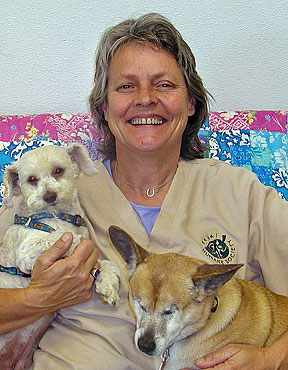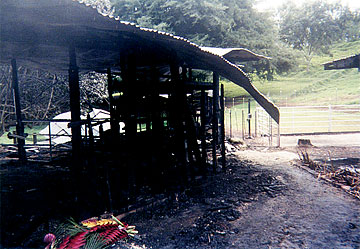
COURTESY PHOTO
Veterinarian Dr. Becky Rhoades, executive director of the Kauai Humane Society, is a longtime animal lover, posing here with dogs Sally, left, and Stella. Sally was found emaciated in New Orleans, and Stella, who is blind, was found injured on a road on Kauai. CLICK FOR LARGE
|
|
Champion for animals
After her horse died in a fire, Becky Rhoades devoted herself to fighting animal cruelty
Kicking through cold cinders at Maunawili Farm, Dr. Rebecca Rhoades felt the suffocating void of senseless loss.
The stable fire that killed her horse, Mulligan, no longer smoldered, but Rhoades could imagine his final, frantic moments engulfed in smoke and flame.
She had gotten the call in Florida, while visiting her mother for Thanksgiving.
"It was just horrible," she recalls. "I couldn't believe it. I was in shock."
But worse news came after she hurried back to Hawaii: The fire was intentionally set.
No arrests were ever made in the November 2001 arson case that rocked Oahu's equestrian community. A second horse, Gentleman Joe, also died in the fire, but if the motive was to punish one of the owners, the dots remain unlinked.
The statute of limitations for the crime ran out Nov. 27, after five years, said Honolulu police spokeswoman Michelle Yu.
Every year since the fire, however, as executive director of the Kauai Humane Society, Rhoades has pushed for a law making atrocious animal cruelty a felony.
"When a helpless pet is hurt by an act of cruelty or neglect, the whole family is hurt and suffers tremendously," Rhoades said Feb. 15 in written testimony before the Senate Judiciary and Labor Committee.
"If someone can be cruel to a helpless animal, they may begin a cycle of violence which can escalate towards humans. Now is the time for Hawaii to recognize this link and provide better protection for our community."
On Tuesday, the measure cleared an important hurdle, passing the House Judiciary Committee 16-0. The bill excludes horses, but Rhoades sees it as progress nonetheless, adding, "We still have some lobbying to do to influence the conference committee."
Part enforcer, part facilitator, Rhoades keeps active on a wide front of animal-welfare issues, winning friends and, presumably, an occasional foe in the process. Her most recent, high-profile case involves an Anahola man accused of leaving 20 dogs to starve.
For 15 days after Hurricane Katrina, she worked with lost and injured animals in New Orleans. She also was instrumental in the dramatic, costly 2002 rescue of Hok Get, a dog left on a drifting tanker in the Pacific.
"Becky is truly a champion for animals and we are very fortunate to have her in Hawaii," says Pamela Burns, president of the Hawaiian Humane Society, which shares interests but no affiliation with its Kauai counterpart. "She has sterilized animals, advocated for the passage of laws to better protect them, rescued animals from abuse and even returned lost animals home. She is a recognized animal-welfare leader nationally and internationally."
A VETERINARIAN widely known as "Dr. Becky," Rhoades grew up in the Midwestern town of Pekin, Ill., south of Peoria, where she was active in the 4-H Club.
"Ours was a big family -- five kids -- and we had a little farm out of town where we had horses," she recalls. "So I grew up with horses, and we had all kinds of dogs and cats."

COURTESY PHOTO
Charred wood was all that remained of the stables that burned at Maunawili Farm on Nov. 27, 2001, killing Rhoades' beloved horse Mulligan and a second horse, Gentleman Joe. CLICK FOR LARGE
|
|
Although she learned to ride on an English saddle, she adapted to bareback and Western and went on to compete in barrel racing and other state-fair-style contests.
After high school, Rhoades headed west to Colorado State University in Fort Collins, where she received zoology and teaching degrees. A part-time job as an animal control officer for Colorado's Larimer County persuaded her to go to veterinary school.
"Being the equivalent of the local dog catcher, nobody ever listened to me," she remembers. "I thought if I became a veterinarian, people would listen to me. So I did. But they don't."
Connections in the equestrian community brought her to an Oahu veterinary clinic in the summer of 1986. She ended up staying.
Mulligan, a cross between a racehorse and quarterhorse, was born in 1993, named after a free golf shot because Rhoades paid no stud fee.
While in private practice, Rhoades began training Humane Society staffers to recognize abuse and neglect in horses. That's when Burns offered her a job as a full-time society veterinarian.
"It made me stop and think of why I went to vet school," she says, realizing then that the animals who saw veterinarians regularly were not the ones that most needed help.
"I quit my practice and went to work for Pam, and it was the best decision I ever made."
Rhoades left for Florida in 1999 when her mother became ill, and worked there for a year, running animal control for Palm Beach County.
After her return, Rhoades joined the Kauai Humane Society and for a while commuted five days a week from Oahu.
"Part of it was, I had Mulligan and was showing him and riding him," she recalls.
BUD GIBSON, whose house on Auloa Road overlooks Maunawili Farm, was in bed about 10:30 p.m. when he heard "this crackling" and some horses kicking. Then came a loud "poom!" -- later determined to be an exploding propane tank.
He looked out the side door, saw flames, ran back in, told his wife to call 911, and pulled on his jeans and rubber boots.
Gibson managed to free one horse, Chief, who was in a stable adjacent to the fire.
"When I slapped him on the butt to get him out of there, I had to push him on the head because he was already disoriented," says Gibson, who owns nearby Town and Country Stables. "The hair on his backside was already starting to singe."
Gibson says he and Harrison Chong, a retired firefighter who works at Maunawili Farm, tried repeatedly to find a way inside the wooden structure, but the fire was too intense.
"Then one of the walls collapsed and we could see the figures of the horses there, and they were already dead," Gibson says.
The Honolulu Fire Department determined that an accelerant had been used at multiple points around the stables. The police department took over the investigation, but no leads materialized, despite a $10,000 reward for information.
Gibson notes that he saw and heard no vehicles on the access road that night, leading him to believe the culprits crept up the stream valley in the dark and left the same way. They would have to have known the area well, he says.
"THAT REALLY was a turning point in my life because I almost didn't come back to work," Rhoades says. "I was ready to drive a truck at that point, something completely different."
But in the end, she says, it strengthened her resolve to make a difference for animals.
"I've gone every year to the Legislature to get a felony law passed," Rhoades says. "There was a higher penalty for burning down the barn than to kill Mulligan, and that doesn't seem right."
On Kauai, she leads a staff of 26 people who handle nearly every aspect of animal welfare.
"Our primary role is to protect animals, encourage the human-animal bond, and to try to intercede and prosecute cases of cruelty when we need to," Rhoades says.
The Kauai Humane Society offers the only public animal shelter on the island and has a state-approved quarantine satellite facility for dogs and cats. The agency also runs spay/neuter and ID programs, a lost-and-found center and a no-leash dog park.
Rhoades never got another horse, but took in two dogs: Sally, found emaciated and mangy in New Orleans; and Stella, found injured on a road on Kauai.
Despite being blind, says Rhoades, Stella is "an amazingly confident little dog."
WHAT IS A 'CLASS C' FELONY?
Senate Bill 1665, sponsored by Sen. Clayton Hee (D, Kahuku-Kaneohe), would establish as a Class C felony any "aggravated cruelty" to a dog, cat, guinea pig, domestic rat or mouse, and various caged birds. Rabbits are included unless bred for eating. Horses are excluded. Class C felonies are the least serious Hawaii felonies, with class A being the most serious.
Maximum penalty: five years in prison and a $10,000 fine
Current class C felonies include:
» Unauthorized control of a motor vehicle
» Hijacking or robbery in the second degree (no weapon used)
» Attacking a police officer, teacher or bus driver (no weapon used)
» Possession, threat or use of a deadly weapon during the commission of another crime
» Fleeing an accident involving substantial bodily injury
» Intentional failure to register as a sex offender
» Importation of fireworks without a license
» Identity theft
Sources: Star-Bulletin archives and Senate Judiciary Committee
|

